
Capital City Origins ~ Asia Part 3
Last updated: Sunday December 12th, 2021
Report this blog
Introduction.
Welcome back, JetPunk readers. It's time to continue on our quest to find the meaning of the capital cities of the world. We've been around Europe, Africa and half of Asia. We are now at the apex of the "Asia Mountain" and starting to go downhill towards the end of the continent. Heading further and further east with a little detour south to Sri Lanka and Maldives, before journeying north towards the Himalayas and beyond (Not quite infinity and beyond but then I'm no Buzz Lightyear).
So, to paraphrase the Spencer Davis Group, let's "Keep on Running". Sorry to you young ones, that was a song from 1965, check it out on Youtube, if you want.
Here we go, Asia Part 3.........
Islamabad. Pakistan.
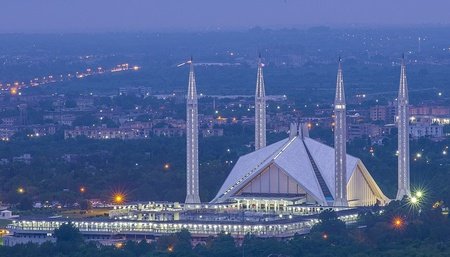
Islamabad was built in the 1960's as a planned city to replace Karachi as the capital of Pakistan. The city is supposedly the safest in Pakistan with an extensive CCTV network. The Faisal Mosque in the picture is currently the largest in South Asia and the fifth largest worldwide.
Islamabad means quite literally "City of Islam". The Persian suffix ~abad means "cultivated place" or city.
ISLAMABAD = CITY OF ISLAM
New Delhi. India.
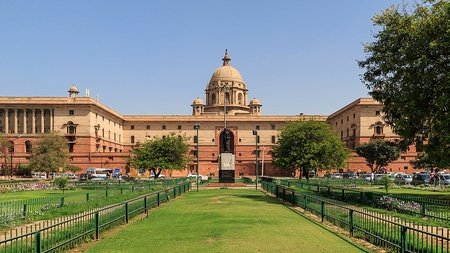
Despite Delhi and New Delhi being used frequently to describe the capital they are in fact two seperate places. New Delhi is actually a small part of the greater city of Delhi.
The city's foundation stone was laid by King George V in 1911, and the city was formally inaugerated in 1931.
For the origins of the name we must first look to Delhi. There are many theories about the etymology.
A king named Dhillu that named it after himself in 50BC.
From the Hindi word dhili meaning "loose", refering to the Iron Pillar of Delhi that had weak foundations.
The name of coins in use around the time of the city's founding
The Hindi words for "gateway" refering to the city being a gateway to the Gangetic Plain.
Many theories, but in my strange mind, I think the gateway hypothesis to be the most plausible.
NEW DELHI = NEW GATEWAY (Unless of course, you know better. Let me know in the comments)
Sri Jayawardenepura Kotte. Sri Lanka.
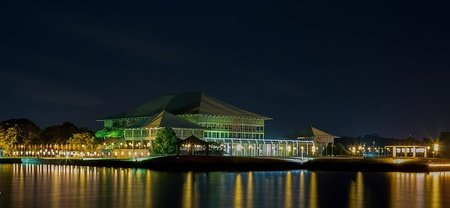
Often shortened to Kotte, this city is the official capital of Sri Lanka, and is a satellite city of the former capital Colombo, where some of the government business is still conducted. The original capital of Colombo was probably named after Christopher Colombus by the Portugese.
Kotte is the Tamil word for "fortress". There was fortress built where Sri Jayawardenepura stands now on a confluence of two rivers.
Jayawardenepura is from the Sinhala language and means "victory enhancing city"
SRI JAYAWARDENEPURA KOTTE = VICTORY ENHANCING CITY FORTRESS
Male. Maldives.
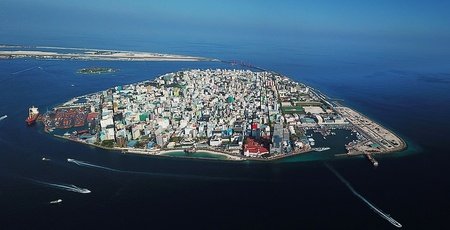
The complete island group of the Maldives is named after the capital city. Maldives means literally "Islands of Male", dives is islands in the Dravidian language. Male is one of the most densely populated islands in the world and as such is not the most environmentally friendly despite the country's image as an island paradise. Electiricty is supplied by diesel generators and sewage is pumped unprocessed into the sea.
The name derives from Sanskrit words maha and le and is thought to mean "Big Blood" refering to the amount of tuna fish that were processed on a nearby sandbank turning the sea into a red mass from the blood.
MALE = BIG BLOOD
Kathmandu. Nepal.
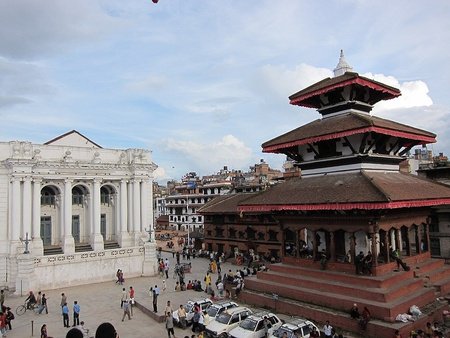
Nestling in the foothills of the Himalayas and a starting point for many mountaineering expeditions, Kathmandu is one of the fastest growing cities in Asia.
It's name comes from Kasthmanandap which was a wooden public shelter and shrine that stood in the centre of the city until it was destroyed during an earthquake in 2015. The word comes from the Sanskrit language and means "Wood pavilion".
KATHMANDU = WOOD PAVILION
Dhaka. Bangladesh.
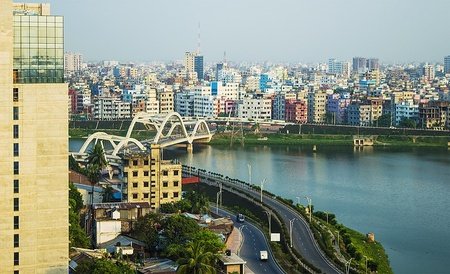
Once called the "Venice of the East", Dhaka was an important sea trading port for many centuries. It was important during the British Raj and as the capital of East Pakistan until 1971 when Bangladesh achieved it's independence.
Theories as to the etymology of the name range from the Dhak trees that used to grow in the area to the Hindu goddess Dhakeshwari. However, the main theory is that it comes from the Prakrit dialect Dhakka meaning "watchtower". The earlier strongholds of the Bengal rulers were nearby and there were dhakka at all of their fortresses.
DHAKA = WATCHTOWER
Thimphu. Bhutan.
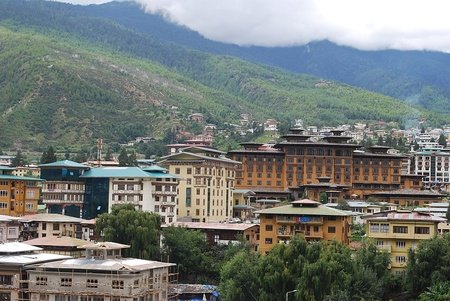
Thimphu replaced the old capital of Punakha in 1955, however the area was then only a collection of hamlets. With the establishment of foreign embassies the city grew rapidly, and is still growing to this day. A recent plan sets out development of the area up til 2027 will see car free pedestrian zones throughout the city.
The only theory I could find is that a traveller in the 14th century happened upon a local God, it was said that the deity dissolved before the travellers eyes, becoming part of the rock on which he stood. Thus the name came to be from two words, thim meaning "dissolving" and phu meaning "high ground".
THIMPHU = DISSOLVING HIGH GROUND
Ulaanbaatar. Mongolia
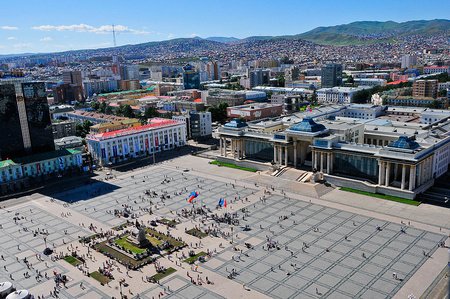
The city was founded as a nomadic Buddhist centre in 1639, but changed it's location 28 times before settling in it's current location in 1778.
There have been various names over the years...Nomiin Khuree (Great Settlement)...Bogdiin Khuree (Great Holy Khan's Monastry)...Urga (Palace)...Niislel Khuree (Capital Camp)
However, in 1924 the city became the capital of the new Mongolian People's Republic and gained the name Ulaanbaatar meaning "Red Hero".
ULAANBAATAR = RED HERO
Beijing. China.
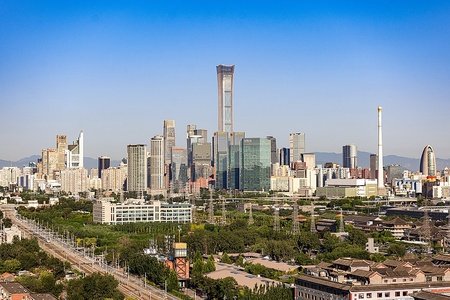
Beijing is the world's most populous capital city with around 21 million inhabitants. The first evidence of people living in the area come from the caves in Dragon Bone Hill, and date back to the time of Homo erectus around 250,000 years ago. Homo sapiens, lived there around 27,000 years ago.
The name Beijing was given to the city in 1403 during the Ming Dynasty to differentiate it from Nanjing which means "Southern Capital". Beijing means "Northern Capital"
BEIJING = NORTHERN CAPITAL
Pyongyang. North Korea.
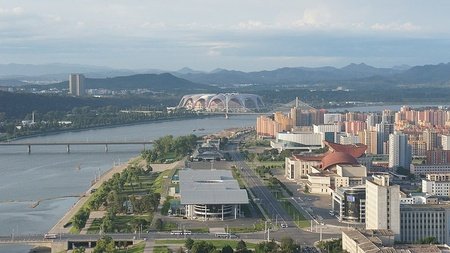
Much of the information about Pyongyang and North Korea in general can be taken with a pinch of salt. The current government do not like to advertise to the outside world, however, it is known that within the country the capital city is known as "Capital of the Revolution". A change to the name was considered in 1994 to Kim Il-Sung City after the death of the former leader. However, the change wasn't implemented.
The name derives from a Sino-Korean word, piarna meaning "level land"
PYONGYANG = LEVEL LAND
Seoul. South Korea.
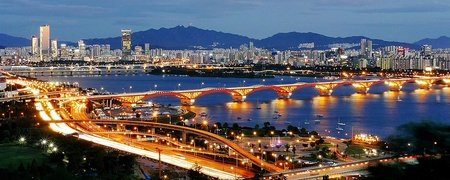
Officially called Seoul Special City, the capital of South Korea has the fourth largest economy in the world. Areas of the city include Gangnam, made famous by Psy in his 2012 global hit.
The name of Seoul originates from the Korean word for Capital. So, quite simply Seoul means Capital.
SEOUL = CAPITAL
Tokyo. Japan.

Originally a fishing village called Edo (which incidently means "Estuary"), but by the mid 18th century it had over a million inhabitants. In 1868 the capital was moved from Kyoto (meaning Capital City) to Edo which was renamed Tokyo.
The name Tokyo comes from two Japanese words, to meaning "East" and kyo meaning "Capital" so Tokyo means "Eastern Capital", so named to distinguish it from Kyoto.
TOKYO = EASTERN CAPITAL
Summary.
Our third section of the Asian tour complete, there were some unusual etymologies and some, quite frankly, boring ones. There's a huge difference between "Capital" (Seoul) and "Big Blood" (Male). What a great name for a city, "Where do you live?"..."Big Blood". Obviously these origins have evolved over centuries and through many language changes, but still, Big Blood !
I have one section of Asia still to compile, featuring mostly islands and Indochina, before I head off into the great expanse of the Pacific Ocean and the countries of Oceania. I've just got to decide on my mode of transport, figuratively of course, do I use a dug out canoe like the Polynesians, or an island hopping plane that will make Greta Thunberg angry. Mmm, decisions, decisions. But i'm getting in front of myself, I've still got to finish Asia yet.
So there you have it, Asia Part 3 in the bag so to speak. Seeing as we finished this episode in the Land of the Rising Sun, I shall bid you Sayonara until next time.

And Big Blood... I always knew Male was something from Evil (Male without “E” = Mal = Bad/Evil) lol
Unfortunately the Youtube video didn't work; It says that WMB took it down in the US due to copyright issues... I suppose it works in the UK though?
Some believe that there was a city established before the Islamic conquest of the city known as Dhillika. This theory is popular among right-wingers and nationalists.
The other theory says that the name originates from Persian/Urdu word dehleez, meaning a gateway. The old city has several gates. Over time, the Brits renamed it to Delhi, which is strikingly similar to the word. In fact, the city is still known as Deh(a)li in Urdu and I believe in Punjabi too. This one is generally supported by liberals and Muslims.
I personally like the second theory but the first theory is also widely popular.